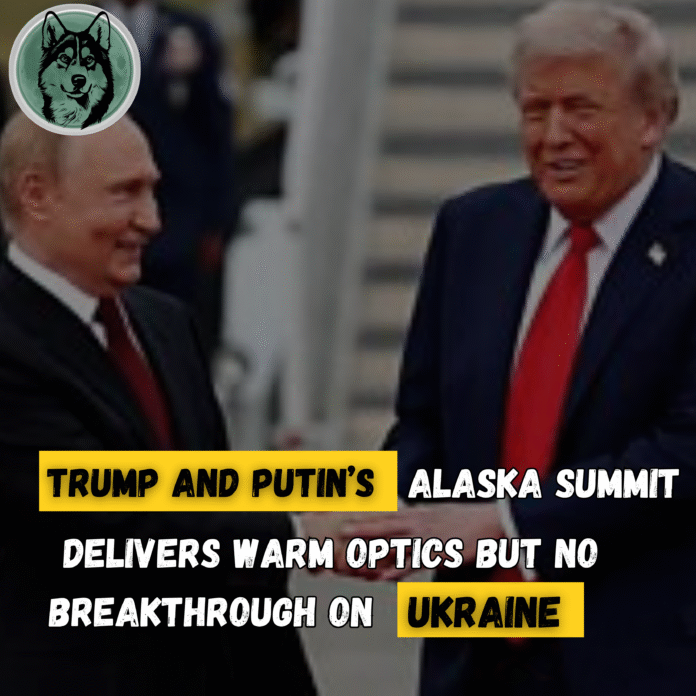After nearly three hours of private talks in Anchorage, both leaders stopped short of announcing a peace plan, with Trump urging Zelensky to “make a deal” while Putin voiced interest in ending the war.
High-Stakes Summit in Alaska
Former U.S. President Donald Trump and Russian President Vladimir Putin met in Anchorage, Alaska, for nearly three hours of closed-door talks aimed at addressing the ongoing war in Ukraine. The meeting, which had been kept under tight security, drew global attention as both leaders remain central figures in shaping the future of the conflict.
Trump told reporters afterward that “there’s no deal until there’s a deal,” acknowledging that a resolution was not achieved but emphasizing that “progress was made.” He described the talks as “serious and direct,” while Putin expressed a “sincere interest” in ending hostilities but stopped short of outlining specific steps.
Symbolism and Optics
Before the talks began, Trump and Putin exchanged warm greetings on the Anchorage airport tarmac. They shook hands twice and then shared a ride in Trump’s limousine to the summit venue. The cordial optics underscored Trump’s personal approach to diplomacy, one he has long promoted as his strength.
However, despite the atmosphere of friendliness, the lack of concrete outcomes suggested that bridging the divide on Ukraine remains as difficult as ever.
Ukraine Not at the Table
Ukrainian President Volodymyr Zelensky was notably not invited to the summit, sparking debate over Kyiv’s exclusion from such high-level talks. Speaking after the meeting, Trump urged Zelensky to “make a deal,” saying it was the only realistic way to stop the bloodshed.
In Kyiv, the absence of an announced deal came as a relief. Analysts believe Ukrainian officials feared that any agreement struck without their involvement could have pressured them into territorial concessions. For now, Ukraine retains the status quo — but uncertainty over its future role in negotiations lingers.
Trump’s Image as Peacemaker Tested
For Trump, who often promotes himself as both a master negotiator and a global peacemaker, the Alaska summit posed both opportunity and risk. While he can claim progress, leaving without a deal highlights the complexity of the war and the limitations of personal diplomacy.
Observers note that the summit signals Trump’s intention to position himself as a key figure in any future peace process, even if tangible results remain elusive.
Background: Why This Summit Matters
The war in Ukraine, now in its third year, has caused tens of thousands of casualties and displaced millions. Several international attempts at mediation — from Turkey, China, and the European Union — have so far failed to produce a sustainable ceasefire or roadmap to peace.
Trump has long argued that he could broker an end to the conflict swiftly if given the chance. The Alaska summit was his most direct step toward testing that claim. For Putin, the meeting provided a chance to show willingness for dialogue with a major Western political figure, even as Russia continues its military operations on the ground.
For Ukraine, the exclusion from talks underscored the risk of being sidelined in negotiations that directly affect its sovereignty. The summit therefore mattered less for what it achieved than for what it revealed: the struggle to align political ambitions, national interests, and the brutal reality of war.
Putin’s Calculated Tone
Putin’s statement following the talks was measured, noting only his “sincere interest” in peace. He avoided making promises or concessions, leaving open questions about Russia’s actual willingness to compromise. His restrained comments suggested Moscow is testing the waters without committing to any binding path forward.
The Road Ahead
The Anchorage summit ended without a clear breakthrough, but both leaders described the conversation as a step forward. While no timeline or framework for a peace agreement was announced, the fact that talks occurred at all may be seen as significant, especially given the war’s toll and the lack of consistent dialogue between Washington, Moscow, and Kyiv.
Whether these discussions pave the way for broader negotiations remains uncertain. For now, Trump departs Alaska with gestures of goodwill but no concrete achievements to present.























